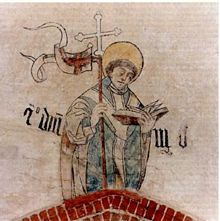Lebuinus
| Lebuinus | |
|---|---|

Fresco of Saint Lebuinus
|
|
| Died | 775 |
| Venerated in |
Roman Catholic Church Eastern Orthodox Church |
| Feast | November 12 |
Lebuinus (also known as Lebuin, Lebwin or Liafwin[e]), Apostle of the Frisians and patron of Deventer (born in England of Anglo-Saxon parents, date unknown; died at Deventer c. 775).
Lebuinus was a monk in Wilfrid's monastery at Ripon. Inspired by the example of Saint Boniface, Saint Willibrord and other great English missionaries, he resolved to devote his life to the conversion of the Germans.
After his ordination he proceeded in 754 to Utrecht, and was welcomed by Saint Gregory, acting bishop of that place, who entrusted him with the mission of Overijssel on the borders of Westphalia, and gave him as a companion Marchelm (or Marcellinus), a disciple of Saint Willibrord.
He preached the Gospel among the tribes of the district, and erected a little chapel at Wilp (see: Voorst) (Wilpa) on the west bank of the IJssel. His venerable personality and deep learning quickly won many to Christianity, even among the nobles, and it soon became necessary to build at Deventer on the east bank of the river a larger church.
However, Lebuinus's great success aroused hostility among the pagans. Ascribing his conversions to witchcraft, they formed an alliance with the anti-Christian Saxons, burned the church at Deventer and dispersed the converts.
After escaping with difficulty, Lebuinus determined to voice the claims of Christianity at the national assembly (Allthing) of the Saxons at Marclo (or Marklo) near the Weser (Northwestern Germany) .
The Vitae of Lebuinus describe in great detail his appearance before the assembly, where, it is claimed, he pointed out to the Saxons the inefficacy of their deities and warned them of impending destruction at the hands of a powerful king unless they converted to Christianity, and with the intercession of the nobleman Buto persuaded them sufficiently of the power of his mission that they not only allowed him to escape with his life but from then on to preach unmolested in the territory allotted him. His life may have been a source of inspiration in the creation of the cultus on Saint Livinus of Ghent.
...
Wikipedia
